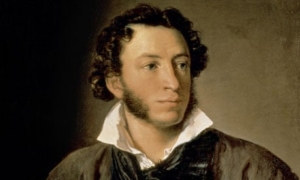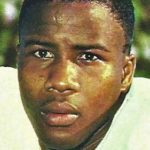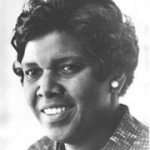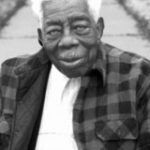The Underground Kitchen That Funded the Civil Rights Movement
Georgia Gilmore’s cooking fueled the Montgomery bus boycott.
Photo: Georgia Gilmore poses for photographers after testifying as a defense witness in the bus boycott trial of Rev. Martin Luther King Jr., March 21, 1956, in Montgomery. (Associated Press)
(Atlas Obscura) On December 5, 1955, four days after Rosa Parks was arrested for refusing to give up her seat on a segregated city bus, a community meeting was held at the Holt Street Baptist Church in Montgomery, Alabama. Thousands of black citizens gathered to hear about the proposed bus boycott, filling every inch of the church’s sanctuary, balcony, and basement auditorium. Loudspeakers were set up to accommodate the overflow, which extended for three blocks in each direction.
Georgia Teresa Gilmore, a cafeteria cook, midwife, and single mother of six, was one of the thousands of people crammed into the church that night. “I never cared too much for preachers,” Gilmore later recalled, “but I listened to him preach that night. And the things he said were things I believed in.”
Gilmore played a pivotal role in the Montgomery bus boycott. In between parenting her six children and juggling two jobs, she single-handedly operated a grassroots fundraising campaign to support the Montgomery Improvement Association (MIA), the organization coordinating the protest.
Gilmore’s role in the movement came at a personal cost—she lost her cafeteria job. But she rebounded quickly. Dr. King lived a couple of blocks away from Gilmore and was a fan of her fortitude and fried chicken. When Gilmore was fired, Dr. King encouraged her to open her own business. With his financial backing, Gilmore transformed her dining room into an unofficial restaurant, which served as a clubhouse for civil rights leaders.
Dr. King was a regular customer at Gilmore’s house, which doubled as his office and social club. Throughout the Civil Rights Movement, Dr. King held clandestine meetings around her dining room table, fueled by fried fish and butter beans. (more)
Lauding Austin civil rights leader William Astor Kirk
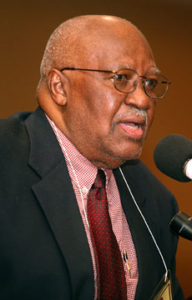 (Austin American-Statesman) Austin needs more guardians of civic memory like Alex Porter.
(Austin American-Statesman) Austin needs more guardians of civic memory like Alex Porter.
The attorney contacted us last year when the African-American Resource Advisory Commission accepted Porter’s nomination of his mentor — late Austin professor, author and leader William Astor Kirk — to be honored for his “unsung work in the areas of civil rights and community harmony.”
Subsequently, the commission added a plaque-like tile to its Portraits Project at the African-American Cultural and Heritage Facility at 912 E. 11th St.
“While current generations may not be aware of his accomplishments,” Porter writes, “the current local leaders are standing on his broad shoulders and enjoying the benefits of his hard labors and his enduring the tribulations of that time.”
An effective leader for decades, Kirk clearly deserves the honor. And Porter’s personal history with his mentor is just as compelling. (more)
Pushkin’s pride: how the Russian literary giant paid tribute to his African ancestry
His black great-grandfather was abducted as a child and raised in Peter the Great’s court. A new Pushkin translation includes the little-known history of Russia’s Shakespeare
(The Guardian) For Russians, Alexander Pushkin inhabits a space beyond taste, where nationalism has given subjective art the patina of fact. He is the undisputed father of their literature in the way Shakespeare is for Brits. Given the insular nature of contemporary Russian politics, it might be hard to imagine that the creator of Eugene Onegin was not only a proponent of multiculturalism and global exchange but an example of it: Pushkin was mixed race, and proud of his African ancestry.
His great-grandfather, Ibrahim Petrovich Gannibal, was probably born in what is now Cameroon in 1696. Gannibal was kidnapped as a child and taken to Constantinople, where, in one of those confounding literary footnotes, one of Tolstoy’s ancestors “rescued” him (this is Pushkin’s own word – vïruchiv – in a 1824 note) and presented him to Peter the Great.
Gannibal exchanged one form of servitude for another, but as page, godson and exotic court favourite to the emperor, his new life was much more glamorous. Following a military education in France, he rose to the nobility and died a general-in-chief with hundreds of serfs: a black aristocrat with white indentured servants in 18th-century northern Europe. (more)
TIPHC Bookshelf
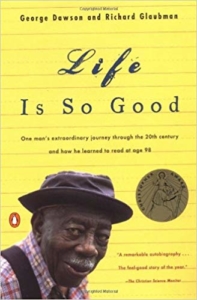 Published scholarship on black history in Texas is growing and we’d like to share with you some suggested readings, both current and past, from some of the preeminent history scholars in Texas and beyond. We invite you to take a look at our bookshelf page – including a featured selection – and check back as the list grows. A different selection will be featured each week. We welcome suggestions and reviews. This week, we offer, “Life Is So Good,” by George Dawson.
Published scholarship on black history in Texas is growing and we’d like to share with you some suggested readings, both current and past, from some of the preeminent history scholars in Texas and beyond. We invite you to take a look at our bookshelf page – including a featured selection – and check back as the list grows. A different selection will be featured each week. We welcome suggestions and reviews. This week, we offer, “Life Is So Good,” by George Dawson.
One man’s extraordinary journey through the twentieth century and how he learned to read at age 98.
“Things will be all right. People need to hear that. Life is good, just as it is. There isn’t anything I would change about my life.”—George Dawson
In this remarkable book, George Dawson, a slave’s grandson who learned to read at age 98 and lived to the age of 103, reflects on his life and shares valuable lessons in living, as well as a fresh, firsthand view of America during the entire sweep of the twentieth century. Richard Glaubman captures Dawson’s irresistible voice and view of the world, offering insights into humanity, history, hardships, and happiness. From segregation and civil rights, to the wars and the presidents, to defining moments in history, George Dawson’s description and assessment of the last century inspires readers with the message that has sustained him through it all: “Life is so good. I do believe it’s getting better.”
This Week in Texas Black History
Jan. 16
 Debbie Allen, actress, director, producer and choreographer, was born on this date in 1950 in Houston. Allen graduated from Jack Yates High School in Houston. In 1989, she became the first African American woman hired by a television network as a director in prime time for the show, “Fame, ” for which she also won an Emmy in 1982 for Best Choreography. She also produced and directed the TV show “A Different World,” and was producer for the 1997 film “Amistad.” She has twice been nominated for Tony Awards — 1980, as Best Actress, “West Side Story”; 1986, as Best Actress (Musical), “Sweet Charity.”
Debbie Allen, actress, director, producer and choreographer, was born on this date in 1950 in Houston. Allen graduated from Jack Yates High School in Houston. In 1989, she became the first African American woman hired by a television network as a director in prime time for the show, “Fame, ” for which she also won an Emmy in 1982 for Best Choreography. She also produced and directed the TV show “A Different World,” and was producer for the 1997 film “Amistad.” She has twice been nominated for Tony Awards — 1980, as Best Actress, “West Side Story”; 1986, as Best Actress (Musical), “Sweet Charity.”
Jan. 16
On this day in 1943, Major General Marcelite Harris was born in Houston. She became the U. S. Air Force’s first African-American female general on May 1, 1991. Among her many other “firsts,” she was also the first woman aircraft maintenance officer, one of the first two women air officers commanding at the U.S. Air Force Academy, and the first woman deputy commander for maintenance. She attained the rank of major general and was the highest ranking woman in the U.S. Air Force and the highest-ranking black woman in the Department of Defense when she retired in 1997. She is the great-granddaughter of I.M. Terrell, founder of the first school for blacks in Fort Worth.
Jan. 16
Paul Gipson, University of Houston running back great, died at age 38 of a heart attack on this day in 1985 in Houston. Gipson had been the school’s all-time rushing leader (2,769 yards) and was a two-time All-America selection. He helped the Cougars to a 13-5-2 record and a pair of Top-20 national rankings during his final two seasons. He helped lead Houston to a No. 2 national ranking in 1967, the highest ranking in school history.
Jan. 17
Tillotson Collegiate and Normal Institute began education classes on this date in 1881 in Austin. The school was chartered by the American Missionary Society of Congregational Churches and its namesake, George Jeffrey Tillotson, a Yale graduate and congregational minister from Connecticut. The school merged with Samuel Huston College in 1952 to form Huston-Tillotson College.
Jan. 17
On this day in 1996, U.S. Congressman and educator Barbara Jordan died in Austin at age 59 from pneumonia and leukemia. A Houston native and graduate of Phillis Wheatley High School, Jordan was elected to the U.S. House of Representatives from the Eighteenth Texas District in 1973, becoming the first Black woman from a Southern state to serve in Congress. Jordan received the Presidential Medal of Freedom in 1994 and held the Lyndon Baines Johnson Public Service Professorship at the LBJ School of Public Affairs, University of Texas at Austin. (See TIPHC Bookshelf for “Barbara Jordan, American Hero.”)
Jan. 18
Major League Baseball player Curt Flood was born on this day in Houston in 1938. Flood’s antitrust litigation in 1970-71 challenging the major leagues’ reserve clause was unsuccessful, however, it led ultimately to the clause’s demise and ushered in the era of free agency for pro athletes. Flood grew up in California and signed his first professional contract while still a senior at Oakland Technical High School. He played for the St. Louis Cardinals from 1958 to 1969 season as one of the league’s best center fielders. He batted over .300 in six seasons and had a career average (1956–71) of .293. At one time, he played in 226 consecutive games without committing an error and in 1966 was errorless for the entire season. He won seven consecutive Gold Gloves for defensive excellence. He received the NAACP Jackie Robinson Award for contributions to black athletes in 1992. His autobiography, The Way It Is, outlined his moral and legal objections to baseball’s reserve system. The book is considered required reading in the history of baseball’s labor movement.
Jan. 18
On this date in 1898, George Dawson was born in Marshall. The grandson of a slave, Dawson was one of the oldest men in America to learn to read and write a book, after he entered a literacy program in Dallas at age 98. Dawson published his autobiography, “Life is So Good,” in 2000 at age 102.
Blog: Ron Goodwin, Ph.D., author, PVAMU history professor
Ron Goodwin is an assistant professor of history at Prairie View A&M University. Even though he was a military “brat,” he still considers San Antonio home. Like his father and brother, Ron joined the U.S. Air Force and while enlisted received his undergraduate degree from Texas Lutheran University in Seguin, Texas. After his honorable discharge, he completed graduate degrees from Texas Southern University. Goodwin’s book, Blacks in Houston, is a pictorial history of Houston’s black community. His most recent book, Remembering the Days of Sorrow, examines the institution of slavery in Texas from the perspective of the New Deal’s Slave Narratives.
Recent Posts
Uncommon integrity
I, (NAME), do solemnly swear (or affirm) that I will support and defend the Constitution of the United States against all enemies, foreign and domestic; that I will bear true faith and allegiance to the same; and that I will obey the orders of the President of the United States and the orders of the…(more)
Democratic hypocrisy
Democracy (noun) – The belief in freedom and equality between people, or a system of government based on this belief, in which power is either held by elected representatives or directly by the people themselves. — Cambridge Dictionary Over a hundred years ago W.E.B. Dubois asked if one could be black and an American. He saw this “twoness” as perhaps the central issue affecting all Africans in America. Personally, I also feel a unique identity crisis…(more)
Submissions wanted
Historians, scholars, students, lend us your…writings. Help us produce the most comprehensive documentation ever undertaken for the African American experience in Texas. We encourage you to contribute items about people, places, events, issues, politics/legislation, sports, entertainment, religion, etc., as general entries or essays. Our documentation is wide-ranging and diverse, and you may research and write about the subject of your interest or, to start, please consult our list of suggested biographical entries and see submission guidelines. However, all topics must be approved by TIPHC editors before beginning your research/writing.
We welcome your questions or comments. Please contact Michael Hurd, Director of TIPHC, at mdhurd@pvamu.edu.

